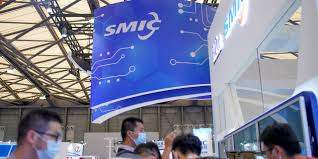U.S. Blacklists China’s Top Chip Maker, Escalating Tech Fight

The Trump administration is adding China’s largest manufacturer of computing chips to an export blacklist, restricting the company’s access to high-end technology over its alleged links to the Chinese military.
Semiconductor Manufacturing International Corp. SMICY -4.72% , or SMIC, will be added alongside more than 60 other Chinese institutions to the entity list, the Commerce Department said. The designation restricts companies from exporting U.S.-origin technology to the listed firms without a license, with a provision that effectively prohibits SMIC from acquiring technology to build chips with 10-nanometer circuits and smaller, the industry’s top class of chips.The move raises the pressure significantly on the chip maker, a national champion that has received billions of dollars in state backing and is central to Beijing’s drive to improve the country’s self-sufficiency in critical technologies. It comes during the waning weeks of the Trump administration and follows a string of actions against Chinese tech companies.
Two days ago, the chip manufacturer said it was looking into reports that one of its two co-chief executives had suddenly decided to step down, a disclosure that sent its shares tumbling.
Commerce Department officials said they applied the restriction on SMIC because of what they said was the company’s cooperation with Chinese military-linked entities. The Trump administration has grown more concerned about Beijing’s practice of leaning on civilian companies to advance its military goals, an effort known as military-civil fusion.
A SMIC representative didn’t immediately comment. SMIC has repeatedly denied any links to China’s military and has said that it produces chips solely for commercial and civilian use.
“Entity List restrictions are a necessary measure to ensure that China, through its national champion SMIC, is not able to leverage U.S. technologies to enable indigenous advanced technology levels to support its destabilizing military activities,” Commerce Secretary Wilbur Ross said in a statement provided to The Wall Street Journal. The blacklisting was first reported by Reuters.
The restrictions directly target the company’s ambitions to catch up with industry leaders in producing the world’s most advanced chips. Under the new rules, the export of all U.S.-origin technology to SMIC will require a Commerce Department license. Applications to support the production of chips at “advanced technology nodes” of 10 nanometers or smaller will be treated with a presumption of denial, while other applications will be evaluated on a case-by-case basis, according to the department.
The tech battle between the U.S. and China has battered TikTok and Huawei and startled American companies that produce and sell in China. WSJ explains how Beijing is pouring money into high-tech chips as it wants to become self-sufficient. Video/Illustration: George Downs/The Wall Street Journal
A senior Commerce Department official told the Journal the policy was designed to prevent SMIC from using U.S. technology to produce the most cutting-edge chips for advanced military applications such as drones, military aircraft and exoskeletons.
“We’re taking this action to address a national-security concern by using a very targeted action that we believe will hopefully begin to move SMIC in a better direction,” the official said, adding that the department has been communicating with SMIC to address its concerns.
Shares of SMIC fell 5% by midafternoon in Hong Kong on Friday.
The Trump administration’s action against SMIC is likely to be one of its last in a series of moves to clip the wings of numerous Chinese tech champions. It threatens to further inflame relations with Beijing, and involve potential retaliation, as the administration of President-elect Joe Biden prepares to take over.
It is unclear whether Biden officials will take a similarly hard-line approach to Chinese firms or unwind any of the current administration’s orders. Under President Obama, Commerce Department officials applied export restrictions more narrowly, typically penalizing companies that ran afoul of U.S. law, and sometimes removing them if corrective action was taken.
Since January 2017, the Trump administration has added more than 300 Chinese entities to its export blacklist.
Previously, a blacklisting could be a death sentence, with sanctioned companies finding themselves cut off from American suppliers almost overnight. In 2018, Chinese telecom firm ZTE Corp. was forced to shut down for a time after it was stripped of export privileges, and only survived after the restrictions were lifted three months later.
In recent years, U.S. companies have found ways to continue selling to entity-listed companies, such as shipping chips or other goods to a sanctioned company whose goods are made overseas. This allowed China’s Huawei Technologies Co. to continue buying huge amounts of American chips despite its entity listing in May 2019. Trump officials later tightened export rules on Huawei, blocking it even from foreign-made chips.
“Commerce’s entity list designations have had uneven effects,” said Dan Wang, technology analyst at Gavekal Dragonomics. “SMIC is likely to suffer more rather than less given its dependence on U.S.-origin equipment.”
The new restrictions run the risk of driving SMIC to foreign suppliers of chip-making technology in lieu of U.S. firms. However, American firms command an overwhelming share of the market for such technology. According to industry group SEMI, U.S. companies control 45% of the market for chip-manufacturing equipment.
The effects of SMIC’s blacklisting will likely be felt by the handful of U.S. companies that dominate the market for chip manufacturing and testing equipment. They include firms such as KLA Corp. , Lam Research Corp. and Applied Materials Inc. The companies didn’t immediately respond to requests for comment.
Currently, SMIC is capable of producing chips commercially at 14 nanometers, but is working on more advanced production lines to compete with industry leaders such as Taiwan Semiconductor Manufacturing Co.
Photo: SMIC will be added to an export blacklist alongside more than 60 other Chinese institutions - ALY SONG/REUTERS
Link: https://www.wsj.com/articles/u-s-blacklists-chinas-top-chip-maker-escalating-tech-fight-11608274932




